Amid rising tensions with Western powers, Iranian President Ebrahim Raisi and Chinese President Xi Jinping pledged to strengthen security and economic cooperation. During Raisi’s three-day visit to Beijing, the two countries signed 20 agreements—including on trade, transportation, information technology, tourism, agriculture, and crisis response—that could be worth billions of dollars. China would invest in joint projects, including a high-speed rail system linking Tehran and Mashhad and improvements to Imam Khomeini Airport.
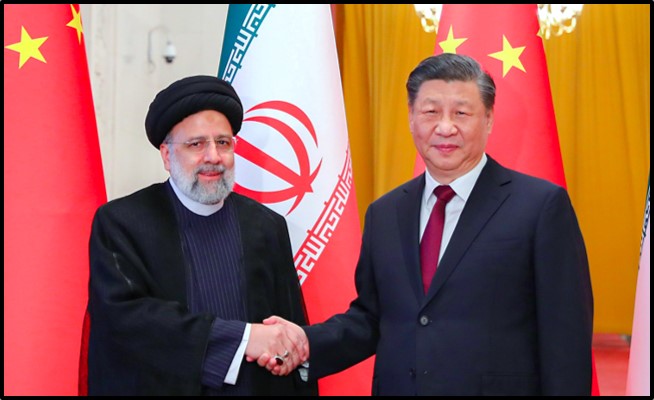
In a joint statement on February 16, Iran and China pledged to “firmly support each other in safeguarding national sovereignty, territorial integrity and national dignity.” China also said it “firmly” opposed “interference by external forces in Iran’s internal affairs and undermining Iran’s security and stability.” During their talks, Xi vowed that China will “unswervingly develop” ties with Iran “no matter how the international and regional situational changes.”
Raisi was the first Iranian leader to make a formal state visit to Beijing in more than 20 years. The summit reflected Iran’s growing pivot to the East under the hardline president, who was elected in 2021. The visit coincided with Iran’s deepening relations with Russia since President Vladimir Putin invaded Ukraine in February 2022. Iran, China and Russia have effectively created a bloc to counter diplomatic pressure and economic sanctions by the West. In 2023, tensions escalated further between the United States and the three powers, albeit over disparate flashpoints. Iran and China are “friends in difficult situations,” Raisi wrote in an op-ed for the People’s Daily, the Communist Party newspaper, before the summit.
Related Material: Timeline of Iran-China Relations
Related Material: Last Among Equals: Iran-China Relations
Raisi and Xi both criticized the foreign policies of Western powers, including the United States. Washington’s policies were holdovers from the Cold War and “caused damage to international norms and global peace and security,” Xi said during the talks. U.S. policy, regardless of which party won the White House, has demonstrated “domineering behavior,” Raisi told Chinese scholars on February 15.
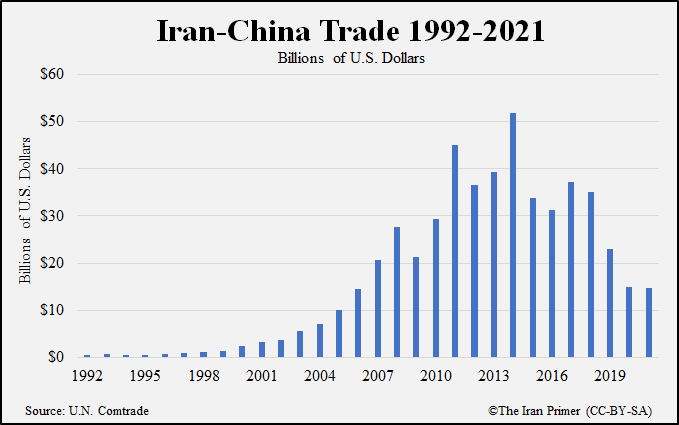
Raisi and Xi also called on the United States to lift sanctions on Iran and “to promote the full and effective implementation” of the 2015 nuclear deal, which President Donald Trump abandoned in 2018. Xi told his counterpart that China would “participate constructively” in negotiations to restore the deal. Talks launched in April 2021 between Iran and six world powers – Britain, China, France, Germany, Russia and the United States – deadlocked in August 2022.
Raisi was eager to secure new Chinese investments. He signaled that Tehran was not satisfied with the slow implementation of the 25-year strategic agreement to deepen economic and security ties signed by their foreign ministers in 2021. “The development of relations between Iran and China has been moving forward, but what has been done is far from what should be done,” Raisi told Xi.
Raisi cited ancient cultural and economic ties between the countries as a foundation for cooperation. China gained “access to the other parts of the world through the ancient Silk Road, and this prosperity and welfare came through … the land of Iran,” Raisi said after being named an honorary professor at Peking University on February 15. “What brings the two countries Iran and China together is the history of civilization,” he told Chinese scholars.

The visit was “heavy on symbolism but short on substance, at least based on public announcements,” said Henry Rome, a senior fellow at the Washington Institute for Near East Policy. “Despite high-flying rhetoric, China remains reticent to make deeper commitments in Iran, given U.S. sanctions, a desire to balance with the Gulf Arab states, and Iran’s dismal business environment.”
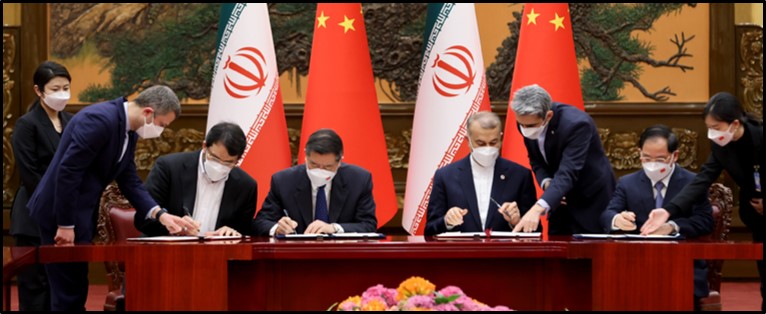
Between 2012 and 2022, Iran was increasingly reliant on China, its largest trade partner. For eight of the ten years, few countries were willing to invest in Iran because of U.S. sanctions. (U.S. sanctions were lifted between 2016 and 2018 as part of the nuclear deal.) China has been the largest importer of Iranian oil—as much as a million barrels a day—despite U.S. sanctions. Beijing generally does not report oil trade with Tehran to avoid being sanctioned by Washington. It has reportedly imported Iranian oil through intermediaries, including in Malaysia and the United Arab Emirates.
Iran sells oil to China at a steep discount of at least 25 percent. Yet Tehran reportedly earned billions in 2022 from oil sales to Beijing. China's crude imports from Iran reached a new record in December 2022, Armen Azizan, an oil analyst, reported on Vortexa, an oil tracking firm.
Trade in non-oil goods totaled $15.8 billion in 2022, a seven percent increase from 2021, according to China’s customs office. China bought goods, including construction materials, metals, and food, worth $6.5 billion from Iran in 2022. The Islamic Republic, in turn, bought goods, including cars and industrial machinery, worth $8.3 billion.
The last president to make a state visit to China was Mohammad Khatami in 2000. Presidents Mahmoud Ahmadinejad (2005-2013) and Hassan Rouhani (2013-2021) visited China but only to attend international summits or sports events. Raisi’s delegation included the central bank governor as well as the ministers of foreign affairs, economy, oil, trade, transport and urban development, and agriculture. The following are remarks by Iranian and Chinese leaders from Raisi’s visit.
Iranian President Ebrahim Raisi
In a meeting with President Xi Jinping on Feb. 14, 2023: “Despite the opposition of the enemies of the Islamic Republic of Iran and China to the consolidation and development of the relations between the two countries, these relations have taken great steps with the favorable management of the two sides.”
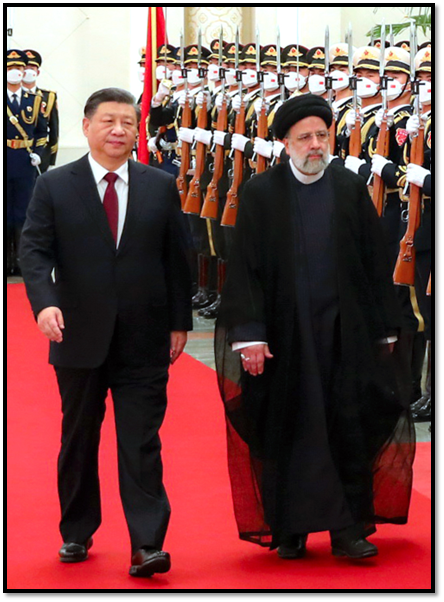
“Westerners once again made a miscalculation regarding the Islamic Republic of Iran, unaware that Islamic Iran and its brave nation are more steadfast than ever before in the path of development and progress.”
“The development of relations between Iran and China has been moving forward, but what has been done is far from what should be done, and to compensate this backwardness, we should take greater steps.”
In a meeting with Chinese business representatives on Feb. 15, 2023: “With the good agreements reached during this trip, the economic companies of the two countries can take great steps to develop cooperation in various fields.”
“There are many untapped capacities in both countries, and both Presidents emphasized on using these capacities to further promote cooperation.”
“Iran considers China a reliable business partner and believes that the capacity of cooperation between the two countries can be used in the development of Iran.”
“Chinese companies can take advantage of these capacities for exchanging goods, as well as investing.”
“China's advancements in new technologies and the development and progress of knowledge-based companies in Iran have created a suitable field for cooperation, which should be used.”
In a meeting with Chinese intellectuals on Feb. 15, 2023: “Today, the situation in the world is developing in such a way that by denying unilateralism, actions such as those used by America and its allies in the region and the world to dominate the nations are rejected and condemned in the public opinion of the world.”
“Today, researchers and thinkers in independent countries are expected to act as a sharp observer of the culture and civilizational identities of their country to protect them from invasions of the domination system.”
“What brings the two countries Iran and China together is the history of civilization, common positions in opposition to unilateralism, independence and negation of domination and subjugation.”
“Iran has huge economic, cultural and geographical capacities, the actualization of which can be very effective in the growth and promotion of countries in the region and even the continent of Asia and shape the future in the name of Asia.”
“The Iranian nation has created many opportunities for itself from oppressive threats and sanctions and has achieved many successes in its progress.”
“Domineering behavior in America is not only specific to one person or a political movement in this country, but in the essence of America’s policies as we have witnessed its implementation by the Democrat and Republican rulers of America in different parts of the world in the past years.”
“We have long-standing relations with China, which are developing in many areas, including in the energy export sector, exchange of products, greater interaction between researchers and student exchange in the universities of the two countries and the implementation of the Belt-Road Initiative to further develop relations.”
“The principle of economic development is a good thing, but considering the valuable historical and civilizational background of Iran and China, economic development should not destroy the cultural foundations of the two nations.”
In remarks at Peking University after being named honorary professor on Feb. 15, 2023: “China [gets] access to the other parts of the world through the ancient Silk Road, and this prosperity and welfare came through the passage of this trade route through the land of Iran, which is not only the most important route in facilitating trade and cooperation among different nations, but also as a cultural thread that has connected different societies together throughout history.”
“With the revival of this initiative in the new world, the two nations have once again reasserted their determination to strengthen friendship and take firm steps towards homogeneous development and strategic partnership for forming a promising future for the prosperity of human society.”
“The new world requires a new order in which real multilateralism, maximum synergy, solidarity and distance from unilateralism will spread as much as possible, so that finally a just order will prevail.”
“Considering that Asia is at the center of emerging global changes, maintaining and strengthening peace in this vast area is not only a choice but a necessity.”
“One of the strategic achievements of the Islamic Republic of Iran is overcoming transnational challenges such as terrorism and extremism in West Asia.”
In an op-ed for the “People’s Daily,” the newspaper of the Chinese Communist Party, on Feb. 13, 2023: “The governments of Iran and China, which have chosen the comprehensive strategic partnership program as a model for their sustainable interactions, have common grounds and similar approaches to international developments. The two countries are against hegemony and unilateralism and emphasize the need to respect the rights and interests of all countries. Both Iran and China deeply believe that by prioritizing spiritual-human values and respect for the right of nations to develop, it is possible to spread peace, fairness, and collective justice in the world. Both countries consider unilateralism and resorting to coercive measures, including oppressive sanctions, as the main root of the crisis and creating insecurity, and emphasize the necessity of joint efforts to achieve real multilateralism and the realization of international justice and fairness and the establishment of just global governance.
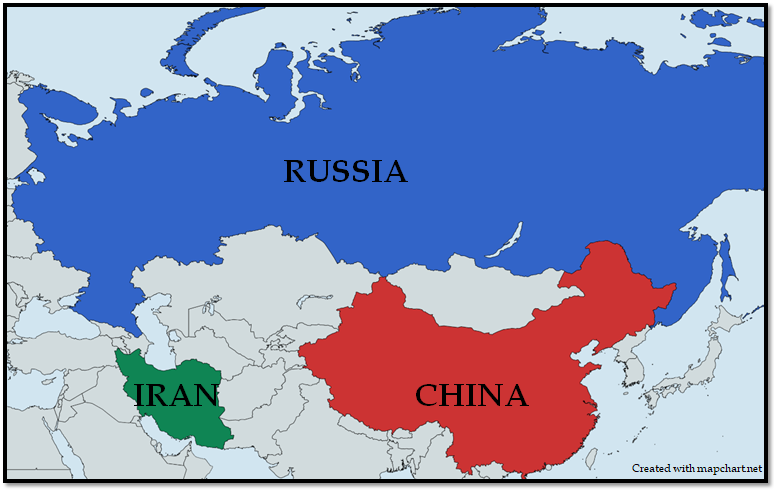
“For Iran and China, who have been in contact and interaction with each other for a long time and have had direct acquaintance and mutual understanding, it is time to get to know each other directly in the new era; not to get to know each other through third parties. Indirect recognition leads to the formation of an understanding between the parties based on the mental framework and interests of the third parties. To achieve this goal, my government seriously supports people-to-people relations, especially academic and tourism interactions between Iran and China. In this regard, I would like to suggest a few points for a better understanding of the lofty goals of the Iranian nation and government:
“The Islamic Republic of Iran believes that progress is originally an endogenous and outward-looking matter. Based on this, the nations should formulate and implement their development plan based on local and cultural governance values and models. The basic interests and rights of nations, including the right to development, are not negotiable, and any attempt by bullying countries to politicize and ultimately deprive nations of their rights by abusing international mechanisms is condemned.
Based on Islamic principles and respect for all religions and cultures, the Islamic Republic of Iran opposes extremism and terrorism and considers it contrary to pure Islam and human happiness. Pure Islam is against terrorism, extremism, and takfiri actions. We believe that the only way to ensure security is to rely on regional actors. Our experience in West Asia has shown that foreign intervention only leads to the intensification of insecurity and the spread of terrorism. Iran's successful experience in fighting the takfiri terrorism of ISIS and preventing its spread to the east and west of the world indicates that Iran's power is a security-building one and its regional capacities support peace and stability in countries and are only used to counter the threat of domineering powers.
“West Asia has experienced extensive changes during the last two decades. The two major wars in Afghanistan and Iraq are only part of the developments that resulted in the spread of terrorism, the displacement of millions of people, and the killing of hundreds of thousands of civilians. In all the years of the past two decades, the Islamic Republic of Iran has shown that, as a powerful and responsible actor, it is ready and able to play an active role in creating and expanding stability and security in the region. We responsibly sided with our Arab friends. Due to its deep connection with the Arab nations of West Asia, the Islamic Republic was able to fight terrorism side by side with them and prove in practice that its interests are dependent only on peace, stability and protection of national sovereignty and territorial integrity of the countries of the region.
The Islamic Republic seeks maximum interaction with all countries in the world, especially friendly powers like China. Beijing has always shown how a country can progress and help the development of others without colonialism, which is characteristic of the Western powers. This approach is respected by the Islamic Republic of Iran.
“Relations between the Islamic Republic of Iran and the People's Republic of China have always been good and developing. The alignment of the two countries in the new state of the international order can lead to the strengthening of these relations. I would like to emphasize that the policy of the Islamic Republic of Iran will continue to strengthen bilateral relations regardless of regional and international developments.
We consider China's economic growth and foreign investment to benefit the people of this country and other nations, and we welcome China's initiatives to promote peace, security, and development in the world. We hope that this positive trend will continue with the management of the far-sighted President of China to achieve lofty goals in the outlook of the coming years.
“We believe that, along with political cooperation and respect for national sovereignty and territorial integrity, Iran and China will be good strategic complementing parties to each other in the path of economic growth and can provide each other valuable mutual services on the path to development. Political independence, security-building power, educated manpower, low cost of production, energy reserves, transit location, and industrial infrastructure are only parts of Iran's capacities that can lead to the strengthening of the strategic partnership between Iran and China.
“The Islamic Republic of Iran appreciates China's role in overcoming the COVID crisis, Iran's membership in the Shanghai Cooperation Organization and joining BRICS Plus, and it is ready to strengthen bilateral relations with China, especially in the field of industrial production and advanced technologies under the 25-year comprehensive strategic partnership program.”
“The culture of friendship and chivalry in Iran is as old as its civilization. Iran and China are friends in difficult situations: ‘Friends are many in feasts and laughter, but few in hardships.’ The bonds of friendship between the two nations, relying on the common will, create many opportunities for deepening strategic mutual trust and a bright future for the relations between the two countries.”
In remarks before leaving for China on Feb. 13, 2023: “First of all, in this trip, the implementation of the 25-year strategic document signed between the two countries will be pursued.”
“The two countries have good relations in the fields of economy, trade, energy, financial and monetary issues, the development of which should be pursued seriously.”
“Iran's membership in the Shanghai Organization is a suitable ground for deepening relations with all Asian countries, including the great country of China.”
“The two countries have common positions in the field of confronting unilateralism and enjoying political independence, which brought us together and led to the formation of good cooperation between Iran and China in the political and international fields.”
Chinese President Xi Jinping
In a meeting with President Raisi on Feb. 14, 2023: “China is willing to continue cooperation with Iran under the Belt and Road Initiative to promote connectivity and expand people-to-people exchanges.”
“China appreciates Iran's willingness to actively improve relations with its neighbors, and supports regional countries in resolving disputes through dialogue and consultation to achieve good-neighborly friendship.”
“China firmly believes in the development relations with Iran.”
“Unfortunately, these [Western] countries still insist on the wrong approach of the Cold War era, and this has caused damage to international norms and global peace and security.”
“The Chinese government is also willing and fully prepared to develop cooperation in the field of trade and transit and cultural relations with Iran.”
“China has always viewed and developed its relations with Iran from a strategic perspective.”
“No matter how the international and regional situation changes, China will unswervingly develop friendly cooperation with Iran, push for new development of the China-Iran comprehensive strategic partnership, and play a positive role in world peace and human progress.”
“In the face of the current complex changes in the world, times, and history, China and Iran have supported each other (and) worked together in solidarity and cooperation.”
“[China] supports Iran in safeguarding national sovereignty, independence, territorial integrity and national dignity... and in resisting unilateralism and hegemonism.”
“[China] opposes external forces interfering in Iran's internal affairs and undermining Iran's security and stability.”
“[Beijing will] promote the early and proper resolution of the Iranian nuclear issue.”
